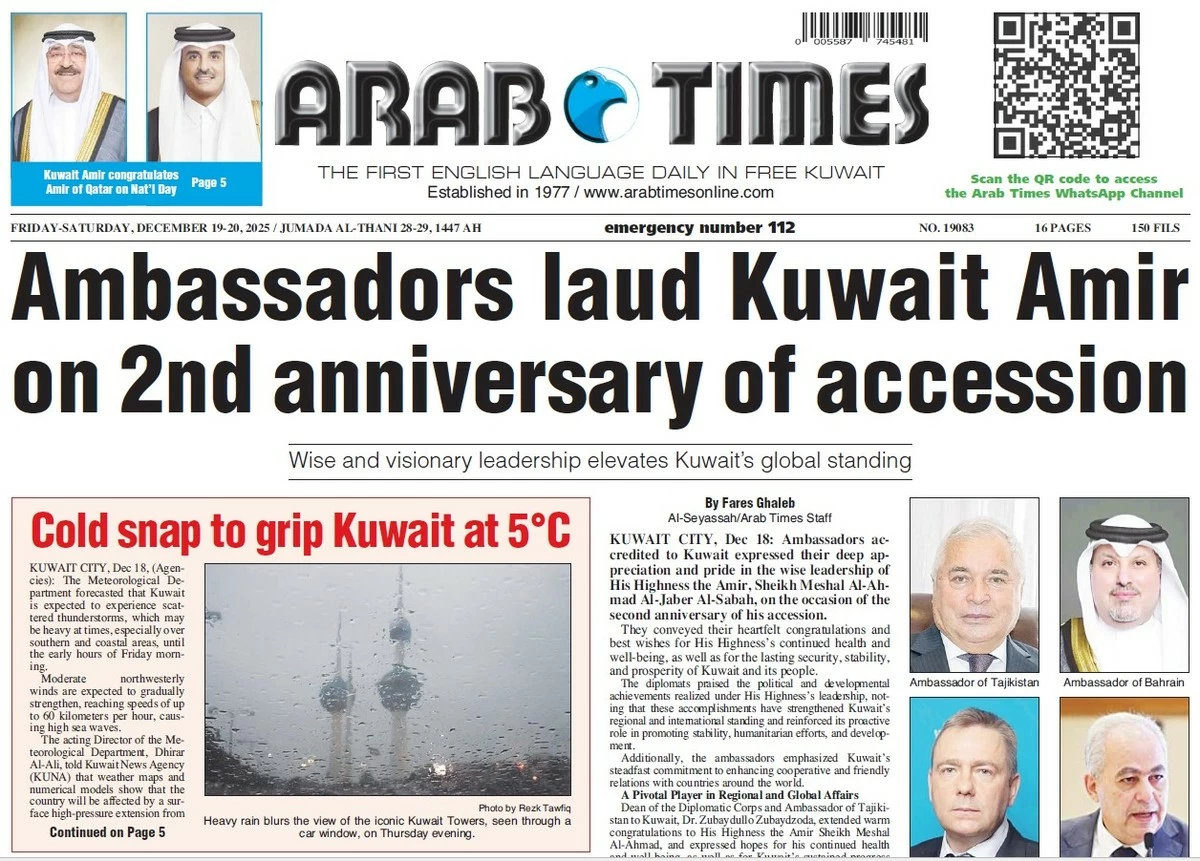08/02/2022
08/02/2022
As many others did not, the distinguished ambassador and well-known diplomat, Mohammad Abdullah Abulhasan, sat in his office and made a great effort in documenting an important stage, the most dangerous in the entire history of Kuwait when our country was subjected to the most heinous, unjustified and despicable attack by a neighbor that was supposed to be closest brother.
Ambassador Abulhasan was Kuwait’s permanent representative to the United Nations when the aggression occurred and the Security Council had a decisive role to play in establishing our right and in pushing dozens of member states in the United Nations to show solidarity with us and participate in the liberation of our land, in unprecedented peaceful, humanitarian and military demonstration in history.
Those decisive decisions related to Kuwait’s sovereignty would not have been issued had it not been for Kuwait’s good reputation in the world, the misbehavior of the criminal Saddam, the loyalty and devotion of Kuwaitis to their homeland and their refusal to cooperate with the occupier, and also in a precedent that the world had not known before.
The Kuwaitis abroad also played a great role, including Ambassador Mohammad Abulhasan who documented that stage of history, with extreme accuracy, in a work that amounts to sober academic research, and deserves to be included in the high school curricula, as the majority of students today do not know what happened during those seven months of the brutal and dreary occupation, and the huge events that followed.
Abulhasan’s book ‘Facts and Mysteries’ is an important document in which he recounted the events of the first minutes of the spread of the news of the invasion until liberation, all the way to the mid-nineties with the Security Council’s final decisions to draw the borders between Kuwait and Iraq, with the adoption of Resolution No. 833, which established the demarcation forever, with prominent US support from the American President George H. W. Bush.
The book also illustrated the shameful stance taken by countries such as Cuba, often to defy America, and the disgraceful stance of the Yemeni regime, which throughout the history of its relationship with Kuwait took the best treatment, and Kuwait has always been the most generous with it.
The writer also indicated the great efforts made by the Secretary-General of the United Nations, Javier de Cuéllar and others to convince Iraq of a peaceful solution, continuously appealing with others to urge Saddam to accept the relevant Security Council resolutions, but Saddam did not respond to any party, and insisted on his position, which subsequently led to Iraq’s destruction.
The author also showed many things that are known for the first time and the great efforts of the Soviet Union to persuade Iraq to put an end to the tragedy, and Moscow’s envoy Yevgeny Primakov put one proposal after another to Saddam, some of which were very generous and in the interest of Iraq, but, fortunately, he rejected all of them.
The author also touched on the secrets of the Geneva meeting on January 14, 1991 between US Secretary of State James Baker and Iraqi Minister Tariq Aziz, who read a copy of President Bush’s letter to President Saddam and refused to receive it because of its sharp tone.
Ambassador Abulhasan also describes his concerns about the possibility that Saddam would accept the principle of negotiation with an actor such as the United States or the United Nations, and that the issue of occupation would turn into bargains that would prolong the suffering of the Kuwaitis, and the crimes of the occupation forces would continue, devoid of mercy, justice or humanity but Saddam Hussein’s stubbornness or rather his extreme stupidity saved Kuwait from the dilemma of waiting, liberating, and demarcating the borders forever, and subsequently eliminating him and all his criminal cowards.
Ambassador Abulhasan’s book, despite its professional and semi-academic nature, is interesting and contains secrets and information about the invasion and liberation. It is not enough to document it, but rather to publish it on the widest scale especially the positions taken by some countries and their suspicious movements, such as Libya’s Gaddafi, Tunisia, Algeria, and Mauritania which neither condemned the invasion nor vote against it during the Arab summit, and later at the United Nations stood with the delegations of Yemen and Cuba.
e-mail: [email protected]
By Ahmad alsarraf


